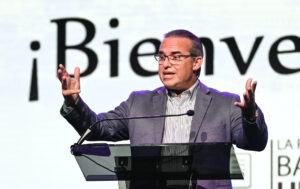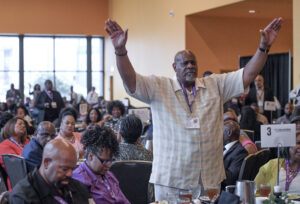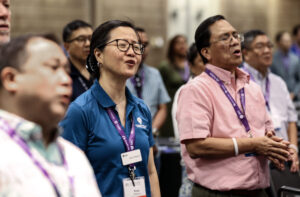
JERUSALEM (BP) – This Passover, Holocaust survivors in southern Israel are afraid to leave their homes, a regional messianic leader told Baptist Press, while in the U.S. anti-Israel demonstrations have disrupted operations and led to arrests at a handful of elite universities.
More than 130 Israeli hostages, their conditions unknown, remained captive as Jews began the traditional celebration of Israeli freedom at sundown April 22. The Israel-Hamas War is exacerbated by attacks between Iran and Israel.
Jews feel isolated and unsafe, said Southern Baptist Messianic Fellowship Missions Development Director Michael Herts.
“There are protests around the world – anti-Israel – shouting ‘death to Jews,’ shouting ‘from the river to the sea,’” Herts told Baptist Press on Passover eve. “And that protest is literally calling for the destruction of the only Jewish state in the world, who are the Indigenous people to that area.”
Several students and faculty were arrested during pro-Palestinian demonstrations at New York University and Yale University April 22, following similar arrests at Columbia University April 19. Protests disrupted classes at Yale and Harvard University Monday, and NBC New York reported demonstrations at several universities across the nation. At Columbia, Rabbi Eli Buechler “strongly” encouraged about 300 mostly Orthodox Jewish students through WhatsApp to return home for Passover and remain there, he told CNN April 21, citing a lack of safety.
Changes in traditional celebrations will vary based on communities, Herts said, but described this Passover as a very difficult time for Jews wherever they live, noting rising antisemitism abroad including Canada, Australia and the United Kingdom.
“Jewish people pay attention to that,” Herts said. “We still have today over 100 hostages in Hamas, and almost no one’s calling for their release. The protests don’t care about them. The protests don’t care that Hamas and Hezbollah are daily shooting rockets into Israel. They call for Israel to cease fire. Nobody calls for Hamas to have a ceasefire.”
Herts also serves as U.S. southeast regional director for Chosen People Ministries, an international evangelistic and humanitarian outreach to Jews in several countries. Chosen People Ministries’ entire missionary staff has remained in Israel during the war, Herts said, holding outreaches and taking food to those in need, including Holocaust survivors in southern Israel.
“Holocaust survivors are afraid to come out of their house in southern Israel,” he said, citing trauma that increases their fear and their advanced ages that make it difficult for them to seek shelter when attacks occur.
“Some of our (Chosen People Ministries) staff in Israel are going down there on a regular basis, coming to their homes to love them in the name of the Lord,” he said, “and to bring them hot meals. We’re very active in Israel with humanitarian aid. We have been since Oct. 8.”
David Trubek, a Chosen People Ministries representative in Tel Aviv, said Iran’s April 13th attack on Israel afforded him an opportunity to share the Gospel with Jews in his community.
“We are very well known as a Messianic leader in our area,” he said in a Zoom video call Chosen People hosted after the April attack. “People decided to come to us, and we had a very good conversation, mostly about faith. It is very important for us as believers in Jesus to find safety in God and then encourage others to do the same.”
He planned to baptize four new believers in advance of Passover, including an Israeli soldier who accepted Christ before the Oct. 7th attack.
“Please know that God continues to do amazing things here,” Trubek said.
The war provides a tremendous opportunity for the church to show its support for Israel, Herts said, applauding fellow Southern Baptists for their advocacy and acknowledging that Israel is not perfect in its military offensive.
“Southern Baptists do a lot more than most,” Herts said. “I’m grateful for that, and that’s one of the reasons I’m part of the Southern Baptist Convention. They are pro-Israel and pro the Jewish people because they are pro the Word of God.”
One of the biggest impediments to Jews receiving the Gospel, he said, is the greater Church’s history of silence and in some cases complicity in the Holocaust, citing notable exceptions in Corrie Ten Boom and Deitrich Bonhoeffer.
“But overall,” he said, “the organized Church was either silent or complicit, and Jewish people know that. And many of the Jewish people whom I share my faith with bring that up to me. And in the United States, for some Jewish people especially Holocaust survivors, this is reminiscent of the time leading up to the Holocaust. Now is the time for the Church to not make the same mistakes of 85 years ago or so.”
Herts encouraged the church to take seriously the call to bless God’s chosen people, particularly in sharing the Gospel.
“How can we bless somebody more than bringing the life-changing message of the Jewish Messiah to the Jewish people?” Herts posed. “That’s the biggest blessing. The biggest need of the Jewish people is to return to our own Jewish Messiah.”















